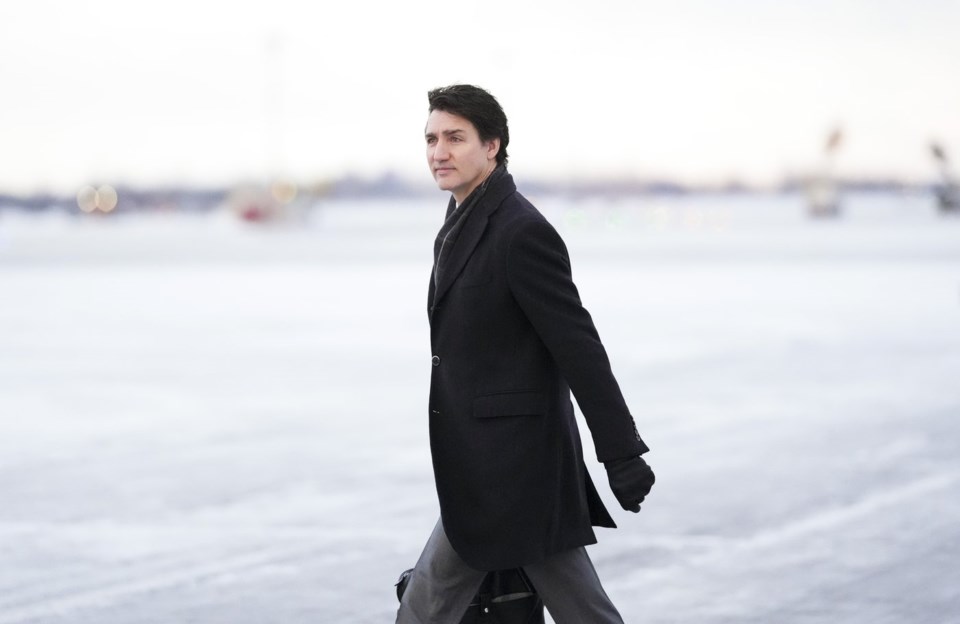OTTAWA — Prime Minister Justin Trudeau’s five-day visit to Europe offers Canada an opportunity to shore up its relationship with the European Union and show Canadian leadership in artificial intelligence regulation, experts say.
Trudeau will spend most of the trip in Paris for the AI Action Summit, the third major global meeting focused on the rapidly expanding field. He will then make a stop in Brussels for a meeting of Canadian and European Union leaders.
The visit comes after U.S. President Donald Trump paused his threatened tariffs on Canadian imports for almost a month — and as Trump signals Europe could be his next target.
"Canada gained this short reprieve and the EU has been threatened with the American tariffs as well, so it makes sense for Canada and the EU to co-ordinate responses," said Carleton University's Achim Hurrelmann, who studies EU politics.
A week ago, Trump signed an order to impose 25 per cent tariffs on Mexican and Canadian imports, with a lower 10 per cent tariff on Canadian energy. But after two phone calls with Trudeau — during which the prime minister laid out his government's plans to address Trump's stated concerns about border security and drug trafficking — Trump put the tariffs on hold until March 4.
Trump said the tariffs would be on pause to see if a "final Economic deal" could be reached with Canada.
As they discuss ways to boost Canada-EU trade, Hurrelmann said, European representatives may ask Trudeau to explain how he managed to get the extension.
"The whole tariff saga has sort of reinvigorated Canada's perennial debate about diversifying trade, and Europe has always been one region where there's the perception … trade could increase," he said, adding Europe may be particularly interested in Canada’s strategic raw materials.
Canada and the EU have a friendly relationship, Hurrelmann said, and consider themselves well-aligned on global issues through two core agreements — the Canada-European Union Comprehensive Economic and Trade Agreement and a strategic partnership agreement.
Foreign Affairs Minister Mélanie Joly said recently that Canada's trade deal with the European Union is "very important and is part of our vision for diversifying our markets."
Hurrelmann said Europe and Canada have been slow to strengthen ties, "especially economic ties."
"The Canadian economy is so focused on the United States, and for the European economy, Canada is a relatively small, faraway market," he said.
But now, he said, the relationship may have the push it needs to move beyond the status quo.
The short jaunt to Brussels, Hurrelmann said, is likely about "signalling to each other that we will co-ordinate, and signalling the same thing to the outside world and also to the Americans."
Artificial intelligence is also likely to come up in the talks with EU representatives in Brussels, he said.
In a press release, the Prime Minister’s Office said the meetings in Brussels will "discuss ways to advance our collective efforts to strengthen transatlantic security, protect the rules-based international order, continue supporting Ukraine, and create opportunities for our peoples, building on the success" of the existing trade agreement.
Trudeau is also scheduled to meet with NATO secretary-general Mark Rutte while in Brussels.
With Trump and the U.S. tech sector pushing back on EU efforts to regulate artificial intelligence, Hurrelmann said the EU’s new artificial intelligence legislation could be a "major future area of conflict” between Europe and the U.S.
The AI Action Summit in Paris follows previous international meetings in the U.K. and South Korea.
While those events were more focused on questions about AI safety and the threats the technology poses, the Paris meeting will focus on such themes as AI and the public interest, the future of work, innovation and culture, and trust in global governance of the technology.
Trudeau also will have a chance to meet with other heads of state at the summit. U.S. Vice President JD Vance is set to attend, and the summit will be co-chaired by Indian Prime Minister Narendra Modi and French President Emmanuel Macron.
China’s Vice Premier Ding Xuexiang is also expected to be in Paris — just as the Chinese AI model DeepSeek is shaking up the field.
DeepSeek offers companies access to its AI chatbot at a fraction of the cost of its rivals, and could push other companies to improve their models and bring down prices.
Rowan Wilkinson, a research analyst for the digital society program at Chatham House in the U.K., said that given the friction between Washington and the EU over regulation, "specific agreements on the direction and rules for AI seem further and further out of reach."
She added in an email that with Vance confirmed to attend the summit, "the attendance of China is much anticipated and would signal a maintained and serious dialogue between these two pivotal players."
— With files from The Associated Press
This report by The Canadian Press was first published Feb. 8, 2024.
Anja Karadeglija, The Canadian Press



